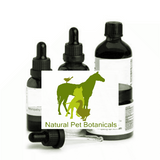

Diabetes Mellitus Support - Set of 4

Diabetes Mellitus Support - Set of 4
Educational Overview
Diabetes Mellitus Support
Formerly referred to as "sugar" diabetes!
Understanding Diabetes Mellitus in Pets
Diabetes mellitus occurs when the pancreas is unable to properly regulate blood sugar.
There are two primary types:
-
Type I (Insulin Dependent) – requires daily insulin injections.
-
Type II (Non-Insulin Dependent) – may respond to dietary changes and careful management.
Feline Diabetes Mellitus
Cats are particularly sensitive to dietary carbohydrates. Common signs include:
-
Weight loss despite increased appetite
-
Excessive thirst (increased water intake)
-
Frequent or excessive urination
Diabetic Neuropathy in Cats
Peripheral nerve changes can sometimes be seen in cats living with diabetes mellitus. This condition is linked with consistently high blood sugar levels, which may place strain on the nerves, particularly in the hind legs.
Possible signs may include:
-
Weakness in the hind legs
-
Difficulty standing on the toes
-
Challenges with jumping
-
Legs slipping or giving way, making walking more difficult
In some cases, discomfort such as tingling or numbness may also be present.
SET OF
Educational Purposes
Nutritional Considerations
Avoid feeding “dry” carbohydrate-rich foods such as kibble or biscuits, as these may contribute to high blood sugar levels. Cats, in particular, are more sensitive to refined carbohydrates than dogs. Diabetes is often considered an acquired condition influenced by diet and lifestyle factors.
Nutrient Support
-
Vitamin B12 has been referenced in relation to nervous system balance and awareness of blood sugar fluctuations.
Reference: PMC Article – Impaired Awareness of Hypoglycemia Improved After Vitamin B12 Treatment
Some practitioners recommend high-quality activated B12 supplements (such as Perque Activated B12 Guard) for long-term support, with benefits often seen over a period of consistent use.
Educational Note on Nutritional Support
Certain nutrients, such as Vitamin B6 (pyridoxal-5-phosphate / P5P form), have been traditionally referenced for their role in supporting nerve and metabolic health.
Some practitioners suggest that adding small amounts of B6 powder from capsules into meals (e.g., ¼ capsule for cats) may assist general wellbeing.
A commonly referenced brand is “Seeking Health,” which provides activated B6 in capsule form. Always ensure supplements are added carefully and monitored, especially in pets with underlying conditions.
"Formulated with plant-based ingredients selected for their gentle role in supporting overall balance and wellbeing.”
1. DB Support 74-1 formula 50ml
2. Emotional Balance 74-2 formula 50ml
* Choose (1) one or more Emotions (A), (B), (C), (D)
B. Stress 133 Balance formula
C. Fear 134 Balance formula
D. Tension Hysteria 135 Balance formula
3. Gluco Balance 74-3 50ml
4. Metabo Ease 72-3 Mix 100ml
Contains:
Formula 1.
Lucerne Grass (Alfalfa 200C)
Blue Flag plant (Iris Vers 200C)
Sodium Sulphate (Nat Sulph 200C)
Fragrant Sumac (Rhus Aromatica 200C)
Small Stinging-nettle (Urtica Urens 200C)
in 20% USP alc. in purified water.
Formula 2.
*Choose one or more emotional (below) your pet may be showing.
Note: All DIABETES patients have an emotional imbalance, that needs to be treated.
A. Depression Balance
Aurum foliatum (Aurum Met 200C)
Black Cohosh (Cimicifuga 200C)
Bach Flowers -
Clematis (Clematis vitalba)
Gentian (Gentiana amarella)
Gorse (Ulex europaeus)
Mustard (Sinapis arvensis)
Star of Bethlehem (Ornithogalum umbellatum) i
Sweet Chestnut (Castanea sativa)
in 20% USP alc. in purified water.
B. Stress Balance
Phosphate of Potassium (Kali Phos)
Bach Flowers -
Cherry Plum (Prunus cerasifera)
Clematis (Clematis vitalba)
Impatiens (Impatiens glandulifera)
Rock Rose (Cistus spp)
Star of Bethlehem (Ornithogalum umbellatum)
in 20% USP alc. in purified water.
C. Fear Balance
Yellow Jasmine (Gelsemium)
Bach Flowers:
Aspen (Populus tremula)
Cherry Plum (Prunus cerasifera)
Mimulus (Mimulus guttatus)
Bach Flowers Rescue:
Star of Bethlehem (Ornithogalum Umbellatum)
Rock Rose (Cistus spp) .
Clematis (Clematis Vitalba)
Impatiens (Impatiens Glandulifera) .
Cherry Plum (Prunus cerasifera)
in 20% USP alc. in purified water.
D. Tension - Hysteria Balance
Champignon fou Fungi (Agaricus 30C)
Yellow Jasmine (Gelsemium 30C)
Nutmeg (Nux Moschata 30C)
Valerian Root (Valeriana 30C)
Common Salt (Natrum Muriaticum 30C)
Phosphate of Potassium (Kali Phos 30C)
St. Ignatius Bean (Ignatia 30C)
in 20% USP alc. in purified water.
Formula 3.
Lucerne Grass (Alfalfa 200C)
Blue Flag plant (Iris Vers 200C)
Jumbul (Syzygium Jambolanum 200C)
Small Stinging-nettle (Urtica Urens 200C)
in 20% USP alc. in purified water.
Bottle 4.
Bitter Melon (Momordica charantia)
Cats Claw (Uncaria tomentose)
St Mary's Thistle (Silybum marianum) .
Bladderwrack (minerals) (Fucus vesiculosus)
Fennel (Foeniculum vulgare)
Comfrey (Symphytum officinale)
in purified water & 30%-40%USP alc.
Need more advice or have more questions? Contact us for a FREE consultation with one of our fully qualified practitioners.
These statements are for general wellbeing and educational purposes only. This product is not intended to diagnose, treat, or prevent any disease. Always seek veterinary or professional advice for specific health concerns.
DISCLAIMER
The statements made regarding these products have not been evaluated by the Food and Drug Administration. The efficacy of these products has not been confirmed by FDA-approved research. These products are not intended to diagnose, treat, cure or prevent any disease. All information presented here is not meant as a substitute for or alternative to information from your health care practitioners. The Federal Food, Drug, and Cosmetic Act require this notice.
Educational Overview
Diabetes Mellitus Support
Formerly referred to as "sugar" diabetes!
Understanding Diabetes Mellitus in Pets
Diabetes mellitus occurs when the pancreas is unable to properly regulate blood sugar.
There are two primary types:
-
Type I (Insulin Dependent) – requires daily insulin injections.
-
Type II (Non-Insulin Dependent) – may respond to dietary changes and careful management.
Feline Diabetes Mellitus
Cats are particularly sensitive to dietary carbohydrates. Common signs include:
-
Weight loss despite increased appetite
-
Excessive thirst (increased water intake)
-
Frequent or excessive urination
Diabetic Neuropathy in Cats
Peripheral nerve changes can sometimes be seen in cats living with diabetes mellitus. This condition is linked with consistently high blood sugar levels, which may place strain on the nerves, particularly in the hind legs.
Possible signs may include:
-
Weakness in the hind legs
-
Difficulty standing on the toes
-
Challenges with jumping
-
Legs slipping or giving way, making walking more difficult
In some cases, discomfort such as tingling or numbness may also be present.
SET OF
Educational Purposes
Nutritional Considerations
Avoid feeding “dry” carbohydrate-rich foods such as kibble or biscuits, as these may contribute to high blood sugar levels. Cats, in particular, are more sensitive to refined carbohydrates than dogs. Diabetes is often considered an acquired condition influenced by diet and lifestyle factors.
Nutrient Support
-
Vitamin B12 has been referenced in relation to nervous system balance and awareness of blood sugar fluctuations.
Reference: PMC Article – Impaired Awareness of Hypoglycemia Improved After Vitamin B12 Treatment
Some practitioners recommend high-quality activated B12 supplements (such as Perque Activated B12 Guard) for long-term support, with benefits often seen over a period of consistent use.
Educational Note on Nutritional Support
Certain nutrients, such as Vitamin B6 (pyridoxal-5-phosphate / P5P form), have been traditionally referenced for their role in supporting nerve and metabolic health.
Some practitioners suggest that adding small amounts of B6 powder from capsules into meals (e.g., ¼ capsule for cats) may assist general wellbeing.
A commonly referenced brand is “Seeking Health,” which provides activated B6 in capsule form. Always ensure supplements are added carefully and monitored, especially in pets with underlying conditions.
"Formulated with plant-based ingredients selected for their gentle role in supporting overall balance and wellbeing.”
1. DB Support 74-1 formula 50ml
2. Emotional Balance 74-2 formula 50ml
* Choose (1) one or more Emotions (A), (B), (C), (D)
B. Stress 133 Balance formula
C. Fear 134 Balance formula
D. Tension Hysteria 135 Balance formula
3. Gluco Balance 74-3 50ml
4. Metabo Ease 72-3 Mix 100ml
Contains:
Formula 1.
Lucerne Grass (Alfalfa 200C)
Blue Flag plant (Iris Vers 200C)
Sodium Sulphate (Nat Sulph 200C)
Fragrant Sumac (Rhus Aromatica 200C)
Small Stinging-nettle (Urtica Urens 200C)
in 20% USP alc. in purified water.
Formula 2.
*Choose one or more emotional (below) your pet may be showing.
Note: All DIABETES patients have an emotional imbalance, that needs to be treated.
A. Depression Balance
Aurum foliatum (Aurum Met 200C)
Black Cohosh (Cimicifuga 200C)
Bach Flowers -
Clematis (Clematis vitalba)
Gentian (Gentiana amarella)
Gorse (Ulex europaeus)
Mustard (Sinapis arvensis)
Star of Bethlehem (Ornithogalum umbellatum) i
Sweet Chestnut (Castanea sativa)
in 20% USP alc. in purified water.
B. Stress Balance
Phosphate of Potassium (Kali Phos)
Bach Flowers -
Cherry Plum (Prunus cerasifera)
Clematis (Clematis vitalba)
Impatiens (Impatiens glandulifera)
Rock Rose (Cistus spp)
Star of Bethlehem (Ornithogalum umbellatum)
in 20% USP alc. in purified water.
C. Fear Balance
Yellow Jasmine (Gelsemium)
Bach Flowers:
Aspen (Populus tremula)
Cherry Plum (Prunus cerasifera)
Mimulus (Mimulus guttatus)
Bach Flowers Rescue:
Star of Bethlehem (Ornithogalum Umbellatum)
Rock Rose (Cistus spp) .
Clematis (Clematis Vitalba)
Impatiens (Impatiens Glandulifera) .
Cherry Plum (Prunus cerasifera)
in 20% USP alc. in purified water.
D. Tension - Hysteria Balance
Champignon fou Fungi (Agaricus 30C)
Yellow Jasmine (Gelsemium 30C)
Nutmeg (Nux Moschata 30C)
Valerian Root (Valeriana 30C)
Common Salt (Natrum Muriaticum 30C)
Phosphate of Potassium (Kali Phos 30C)
St. Ignatius Bean (Ignatia 30C)
in 20% USP alc. in purified water.
Formula 3.
Lucerne Grass (Alfalfa 200C)
Blue Flag plant (Iris Vers 200C)
Jumbul (Syzygium Jambolanum 200C)
Small Stinging-nettle (Urtica Urens 200C)
in 20% USP alc. in purified water.
Bottle 4.
Bitter Melon (Momordica charantia)
Cats Claw (Uncaria tomentose)
St Mary's Thistle (Silybum marianum) .
Bladderwrack (minerals) (Fucus vesiculosus)
Fennel (Foeniculum vulgare)
Comfrey (Symphytum officinale)
in purified water & 30%-40%USP alc.
Need more advice or have more questions? Contact us for a FREE consultation with one of our fully qualified practitioners.
These statements are for general wellbeing and educational purposes only. This product is not intended to diagnose, treat, or prevent any disease. Always seek veterinary or professional advice for specific health concerns.
DISCLAIMER
The statements made regarding these products have not been evaluated by the Food and Drug Administration. The efficacy of these products has not been confirmed by FDA-approved research. These products are not intended to diagnose, treat, cure or prevent any disease. All information presented here is not meant as a substitute for or alternative to information from your health care practitioners. The Federal Food, Drug, and Cosmetic Act require this notice.
Related Products


Canine Resilience Support - Worldwide

Parasite Support - HOM ParaXpel 49
(1)

Insect Bite Reactions Support
(6)

Canine Health Kit






